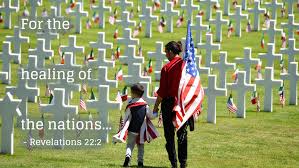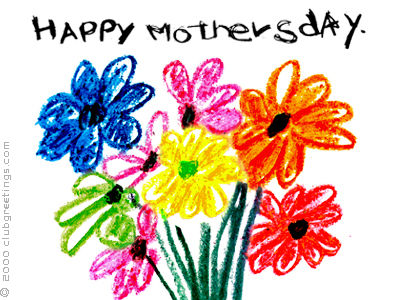
Michael McCastle, a veteran, endurance athlete, philanthropist, once pulled a 2.2 ton truck for 22 miles across Death Valley in the Mojave Desert–the hottest recorded desert in the world. It took 19 hours, but he pulled the truck with a body harness -- one mile for every veteran life lost to suicide each day. To McCastle, Death Valley represents the mind of the afflicted; desolate, lonely and hopeless. So the feat symbolizes hope for life. No matter what the environment around us is or what darkness the day brings, we are surrounded by the Peace Jesus gives. McCastle is a peace giver, in Jesus’ footsteps.
Memorial Day, a day to remember our fallen dead has its American roots in the Civil War, many believe it began in the action of African American former slaves who gathered in 1865 to remember the Union dead. There is no doubt that we participate in an ancient ritual going back thousands of years. In ancient Athens, public funerals for fallen soldiers were held after each battle, with the remains of the dead, on display for public mourning before a funeral procession took them to their internment in one of the city’s most prestigious cemeteries.
War and conflict have been close companions to human society. It is said recorded human history has known perhaps 280 years of peace. The rest is war and conflict. Upwards to one billion people have died as a result of war and its aftermath -- not to mention the refugee and economic crises prompted by war. No wonder there is so much grief. No wonder we desperately need to be peace seekers, after the peace Jesus gives.
For us as Christians we find ourselves in a quandary. Every religion has some form of the ‘golden rule’ ‘Do unto others no harm’ But for Christians war goes completely against our deepest understanding of the Gospel Jesus’ teaching on the Kingdom of God… on earth as in heaven… is a vision of peace where there is no war, as the prophet Isaiah declared, “nor again will we ever be trained for war” (Isaiah 2:4b). And yet war continues, and Christians participate, often initiate war for a variety of reasons. In the face of war and conflict, how do more prophetic and challenging are Jesus words, said before his death: “Peace I leave with you, my peace I give you. I do not give to you as the world gives.” John 14:27
It is said, where armies march, thorns grow for fifty years. Because of the prevalence and devastation of war, Jesus recognized the pivotal role we have to bring healing, to walk in his peace be bridge builders in times of woundedness. Peace seekers look for more than the cessation of war: they seek reconciliation, mutual understanding, well-being for all peoples.
It is interesting to note that Jesus doesn’t say blessed are the peaceful or pacifists but blessed are the peacemakers – those who actively seek to create conditions of peace. We are called to build peace into our everyday life. We are invited to live so that the peace of God permeates all we do—from the interchanges we have in a shopping line, in a traffic jam, at work, on Facebook, and other interchanges we have with family, neighbors and friends. Peacemakers are concerned about the conflicts in each human heart no matter how they manifest. The conflicts that tear us apart inside – that keep us from God and each other. However, it doesn’t stop there.
We may not be called to fight battles thousands of miles away, but that doesn’t mean we don’t find ourselves in battles in our own backyard or in our Town Squares. It is here where we are asked to employ the tools of peacemaking. To listen actively, to be respectful, to speak our truth with humility, to seek mutual understanding wherever possible.
Jesus is the original peacemaker, and in his care for others and teachings he models how we are to live out peace. By bringing peace, wholeness, forgiveness, God’s love, the gospel, to others. Jesus sacrificed his life to reveal the extent of the Father’s love for us and free us from sin. That’s what peacemakers do. They go the distance for the wounded and hurting.
So modern peacemakers, peace seekers: are concerned about the wounded living. They are not just focused on the conflicts our homes, not just out there in the world but the conflicts in our society that divide rich from poor, divide races and ethnic groups and people of faith. Peace is interconnected and comprehensive. These are our marching orders. Are we ready for the boot camp of peace? Will we drill in the tools that dismantle conflict and war? Are we ready to invest as much time, money and talent in the things that make for peace as we do those things that support war?
Soon after the Civil War, it is said that a group of women asked the War Department for permission to put flowers on the graves of soldiers buried at Arlington Cemetery. Permission was finally granted to do so, with a caveat: No flowers were to be placed on the graves of the Confederate soldiers. The confederates were buried in a segregated section of the cemetery.
The ladies carried out their task and carefully followed their instructions. A crowd gathered for the commemoration at which General Grant gave a speech.
But shortly after the ceremony concluded, they say a strong gust of wind blew through the cemetery… and the wind blew almost all the flowers into the Confederate section. After that the separation was never repeated. Many believed that the wind had sent by the hand of God. There it was: God – divine peacemaker, reconciling in both death and life.
May the same hand of God work through peacemakers to scatter the prejudices of the living this Memorial Day. May the fallen, dead and living, be honored with the peace of Christ, which passes all understanding. May we, the living, honor them as we claim the call to peace in all walks of life. Amen.


 RSS Feed
RSS Feed